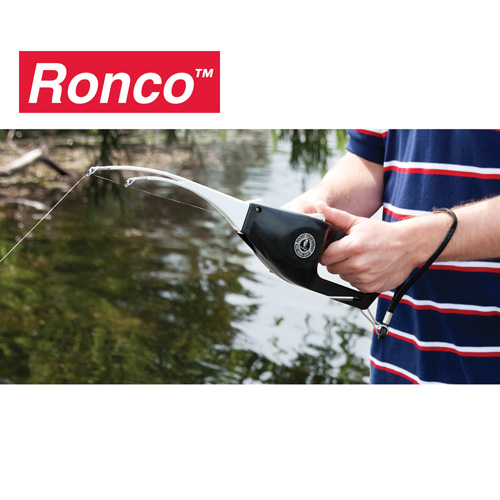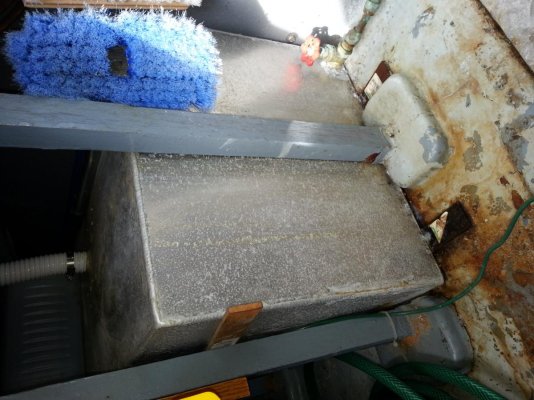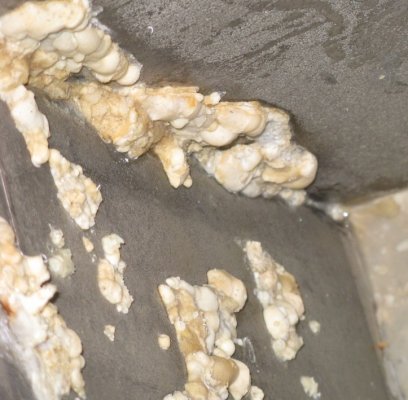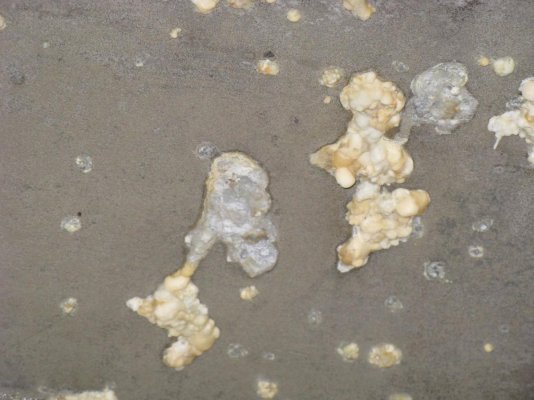You are using an out of date browser. It may not display this or other websites correctly.
You should upgrade or use an alternative browser.
You should upgrade or use an alternative browser.
Water Tanks - Repair/Replace - Opinions
- Thread starter CarlinLA
- Start date
The friendliest place on the web for anyone who enjoys boating.
If you have answers, please help by responding to the unanswered posts.
If you have answers, please help by responding to the unanswered posts.
RT Firefly
Enigma
Greetings,
Mr. CLA. Since it's only water, the cheapest may be to remove and have welded IF that cross beam is readily removed. It'll be 50/50 IMO but for the probably cheap repair what have you really got to lose? In anticipation of possible failure, alter that cross piece so it IS easily removed.
Mr. CLA. Since it's only water, the cheapest may be to remove and have welded IF that cross beam is readily removed. It'll be 50/50 IMO but for the probably cheap repair what have you really got to lose? In anticipation of possible failure, alter that cross piece so it IS easily removed.
I'd replace. It looks like you have good access. A cheap upgrade as far as boating goes. 

I'd replace. It looks like you have good access. A cheap upgrade as far as boating goes.


If the leak is in a flat panel an inch or more from a corner, you can go to a plumbing supply store and buy a plug to stop the leak. You drill out the hole a bit and then insert it like a toggle bolt and then tighten the head to expand the rubber and seal the leak. I used one on a water pressure tank in a previous home. That's not the best way to deal with the problem but it will work and probably last until you get another leak somewhere else.
If it's leaking at a seam or corner, that won't work.
Replacing the tank is the permanent solution.
If it's leaking at a seam or corner, that won't work.
Replacing the tank is the permanent solution.
City water is chlorinated, and chlorine is corrosive. Even if your water is from a well, if you add bleach to each fill, you're adding a corrosive. The average of life an aluminum water tank is about 20 years...steel a bit longer. And the first leak in any metal water or waste tank is always just the FIRST leak. Your tank is 30 yrs old. So I'd bite the bullet and replace it now.
Or you can be like a guy on one of the houseboat sites I was on several years ago who'd patched his aluminum water tank in so many places that he'd just about turned it into a tank made entirely of JB Weld!
Or you can be like a guy on one of the houseboat sites I was on several years ago who'd patched his aluminum water tank in so many places that he'd just about turned it into a tank made entirely of JB Weld!
ddalme
Senior Member
Having repaired lots of alum. tank, both fuel and water, pull it and see if you can locate the leak. My experience it will have a cracked weld. If cracked in the weld, drill a 1/8 hole on each end of the crack and weld it up. Should last another 30 years or so. If the leak is in the sides or bottom-away from the welded seams, probably be from corrosion and then I'd replace it. Good luck with it. Let us know what you find and do.
Not a doctor ... but hasn't aluminum been linked to alzheimers ?
I don't remember.
raindr
Veteran Member
agree with all the above, if you decide to replace and buy from ronco, and can give them a business license the price will come down approx 40%. I know, I bought a tank from them last week, Linda is who you want to talk to and she is great on customer service.
Bruce
Bruce
CarlinLA
Senior Member
agree with all the above, if you decide to replace and buy from ronco, and can give them a business license the price will come down approx 40%. I know, I bought a tank from them last week, Linda is who you want to talk to and she is great on customer service.
Bruce
At negative 40% Ronco would make it a simple choice.
I do not have a business license... hummm...
Plus... who says i have to replace both tanks now?
Could be a quality fix for under $300.
RT Firefly
Enigma
Greetings,
Mr. CLA. Maybe Ronco will throw in one of these as a bonus...

Mr. CLA. Maybe Ronco will throw in one of these as a bonus...

Someone you know must have. Nobody says a water tank has to in your name.CarlinLA; said:I do not have a business license... hummm...
RT, Ronco Plastics is no relation to the Pocket Fisherman and VegoMatic Ronco.
Btw, any way you can make your photos any larger? There's still at least 1/4" of space left in the box.
Btw, any way you can make your photos any larger? There's still at least 1/4" of space left in the box.
Someone you know must have. Nobody says a water tank has to in your name.
Wouldn't it be a bit dishonest to claim you had a business when you actually don't to get a discount on a product?
High Wire
Guru
I'll bet you will find more than one leak or area of wall thinning where the tank sits on those supports. So unless you do your own welding, I would just go for a new plastic tank. Remove the tank, inspect, take it to a tank shop, and decide.
Oh, come on. There is nothing dishonest about a person with a business license buying the tank at a discount and gifting it to him.Wouldn't it be a bit dishonest to claim you had a business when you actually don't to get a discount on a product?
Good grief.
jungpeter
Guru
Lucky is the owner with access to the top of ANY tank, such as you apparently have! Now, on to your solicitation of opinion regarding repair or replace.
Judging from appearance, your tank is aluminum. If so, and it's currently leaking, and 30 years old, I believe the tank has reached end of service life, and should be replaced. There are less-expensive ways to solve your (current) leak, but the "fix" will be far from permanent. You can butch up a repair with all kinds of gak. JB Weld, 5200, duct tape, etc etc. And that's all I'll say about that!
If your (again, presumed) aluminum tank has been routinely filled from city water, most likely that water has been chlorinated. If so, that chlorine has reacted with the aluminum alloy, forming several oxides on the inside. One of them, aluminum oxide, forms hard "crusticles" on the internal walls and floor. Under each crusticle lies a corrosion pit, where the oxide "mines" its contents. Once that pit breaches the wall, the tank leaks.
Welding that hole from the outside may be possible, depending on where the leak site is, how clean the welder can get the weld site, how much "junk" remains inside, etc. It is very unlikely that any welder will attempt a weld repair, even on a water tank, inside a boat hull. Given you can get to the top already, I would pop in an access port immediately (Seabuilt - Access Plate Systems), inspect the interior, and go from there.
Plastic tanks work fine for water. Finding one that fits is another story, although Ronco (Ronco Plastics - Marine Water Tanks, RV Water Tank, Auto Detail Tanks, Water Tanks) apparently has several hundred sizes available. Another very good alternative for a custom tank replacement is 316L stainless, from a competent tank manufacturer. If you go the custom tank route, 316L is my personal choice for water tanks, with due diligence regarding design and installation of same.
Regards,
Pete
Judging from appearance, your tank is aluminum. If so, and it's currently leaking, and 30 years old, I believe the tank has reached end of service life, and should be replaced. There are less-expensive ways to solve your (current) leak, but the "fix" will be far from permanent. You can butch up a repair with all kinds of gak. JB Weld, 5200, duct tape, etc etc. And that's all I'll say about that!
If your (again, presumed) aluminum tank has been routinely filled from city water, most likely that water has been chlorinated. If so, that chlorine has reacted with the aluminum alloy, forming several oxides on the inside. One of them, aluminum oxide, forms hard "crusticles" on the internal walls and floor. Under each crusticle lies a corrosion pit, where the oxide "mines" its contents. Once that pit breaches the wall, the tank leaks.
Welding that hole from the outside may be possible, depending on where the leak site is, how clean the welder can get the weld site, how much "junk" remains inside, etc. It is very unlikely that any welder will attempt a weld repair, even on a water tank, inside a boat hull. Given you can get to the top already, I would pop in an access port immediately (Seabuilt - Access Plate Systems), inspect the interior, and go from there.
Plastic tanks work fine for water. Finding one that fits is another story, although Ronco (Ronco Plastics - Marine Water Tanks, RV Water Tank, Auto Detail Tanks, Water Tanks) apparently has several hundred sizes available. Another very good alternative for a custom tank replacement is 316L stainless, from a competent tank manufacturer. If you go the custom tank route, 316L is my personal choice for water tanks, with due diligence regarding design and installation of same.
Regards,
Pete
Great information, Pete. I wonder how many here would ever have connected the dots (or spots) related to city water.jungpeter; said:Now, on to your solicitation of opinion regarding repair or replace.

Oh, come on. There is nothing dishonest about a person with a business license buying the tank at a discount and gifting it to him.
Good grief.
Good grief?
It's dishonest no matter how you spin it. Shopping for a better price is fine. Lying to get one is "lying".
Oh, OK. So, if you had kids, they always knew there wasn't a Santy Claws, right?Good grief?
It's dishonest no matter how you spin it. Shopping for a better price is fine. Lying to get one is "lying".
I don't mean to BE a poop, and I have no authority to ask but I will anyway: would you two mind taking your ethics debate somewhere else?
Thank you!
Thank you!
ulysses
Guru
While the "city water" and chlorine may have been a small factor is the demise of the 30 year old aluminum water tank it is receiving far too much blame. If the city maintained a 2 parts chlorine per one million parts of water the ph and corrosiviness of the water should have been minimally effected. Anti-corrosion measures and/or inhibitors would have been required of the system if the water became overly corrosive. Well, that is the way its supposed to work other than in Flint, Michigan.
Remember that as the chlorine is entering the tank and as the water is exposed to 02 the chlorine diminishes.
A factor that may be playing a greater role in the life of the tank would, IMHO be the dissimilar metals. Aluminum tank should not be touching the steel brace and bulkhead.
Remember that as the chlorine is entering the tank and as the water is exposed to 02 the chlorine diminishes.
A factor that may be playing a greater role in the life of the tank would, IMHO be the dissimilar metals. Aluminum tank should not be touching the steel brace and bulkhead.
Irish Rambler
Guru
- Joined
- Apr 29, 2014
- Messages
- 1,733
- Location
- FRANCE
- Vessel Name
- 'Snow Mouse.'
- Vessel Make
- BROOM FLYBRIDGE 42.
First question. How long do you plan to keep the boat ?
I had a similar quandary when one of my galvanised tanks sprung a leak. As I planned on keeping the boat for some years, after considering all options, I did a redneck repair to cover me until autumn.
After the season's cruising I stripped out the engine room, there are two 225 litre tanks, one each side of the engine compartment, removed one of the tanks and took it to a stainless fabricator and had an exact dimensional copy made with bright annealed interiors (mirror finish) with two modifications, two small access hatches on top for cleaning and a small sump with drain tap for any sediment.
It wasn't cheap.
I refitted the tank, spray foamed the bed underneath, between the rear of the tank and hull, then sheeted the sides and front with expanded polyurethane.
I did the same with the other tank, replaced fittings & plumbing in new 'food grade' quality hardware and fitted an electronic anti lime scale system.
Cash with no receipt (it's an Irish way of life) got me great discount deals with suppliers.
£3,000 seemed a lot of money in 2006, but it was money well spent.
The system's still working perfectly 10 years later after cruising the West coast of Scotland, around Ireland, England, France, Spain and Italy.
As fresh water is such a key health element your better just to bite the bullet and do a really first class job.
As we say in our family business motto, Quality is remembered long after price is forgotten.
I had a similar quandary when one of my galvanised tanks sprung a leak. As I planned on keeping the boat for some years, after considering all options, I did a redneck repair to cover me until autumn.
After the season's cruising I stripped out the engine room, there are two 225 litre tanks, one each side of the engine compartment, removed one of the tanks and took it to a stainless fabricator and had an exact dimensional copy made with bright annealed interiors (mirror finish) with two modifications, two small access hatches on top for cleaning and a small sump with drain tap for any sediment.
It wasn't cheap.
I refitted the tank, spray foamed the bed underneath, between the rear of the tank and hull, then sheeted the sides and front with expanded polyurethane.
I did the same with the other tank, replaced fittings & plumbing in new 'food grade' quality hardware and fitted an electronic anti lime scale system.
Cash with no receipt (it's an Irish way of life) got me great discount deals with suppliers.
£3,000 seemed a lot of money in 2006, but it was money well spent.
The system's still working perfectly 10 years later after cruising the West coast of Scotland, around Ireland, England, France, Spain and Italy.
As fresh water is such a key health element your better just to bite the bullet and do a really first class job.
As we say in our family business motto, Quality is remembered long after price is forgotten.
Last edited:
jungpeter
Guru
Ulysses: With all due respect, I must disagree. if the "crusticles" shown in the first picture of the inside of my water tank weren't caused by an oxide of aluminum precipitated out of the aluminum itself by contact with elementary material resident in city water, I'd sure like to know a more likely cause. While you are correct that chlorine which is typically added to water systems as sodium hypochlorite (bleach) to kill bacteria is rendered less-active by contact with oxygen, and the sodium hypochlorite eventually loses it's toxicity to bacteria after contact with oxygen, it remains as a proven reactant to the aluminum alloying elements extent in the tank material itself.
Water is nature's universal solvent. Time and water will ultimately fail all materials. And when man introduces impurities into that water (bleach in a boat's water tank for instance) that timeline is shortened. How short? In my opinion, a 25-year service life for aluminum water tanks is about it. Anything longer and you're on borrowed time.
Determining the ultimate cause of CarlinLA's water tank failure is impossible by viewing a single picture of the exterior of a 30 year old tank. If I implied otherwise, I apologize. But that's not the question he posted. He simply asked "fix it or junk it". I thought my answer was pretty clear-junk it.
Determining the cause of MY 26-year old water tank failure was easy, once the tank was forensically (and destructively) examined by a professional materials scientist post-replacement. The second picture hopefully illustrates the corrosion pit beneath each "crusticle" shown in the first picture. And my leak occurred at one of those pits. Dissimilar metals (other than, perhaps, those dissolved elementally in the city water inside the tank) DID NOT contribute to my tank failure. And, I would be willing to wager that many, many aluminum water tanks in pleasure boats afloat today look very like mine did. Sure got my attention, and my $$$$!
Regards,
Pete
Water is nature's universal solvent. Time and water will ultimately fail all materials. And when man introduces impurities into that water (bleach in a boat's water tank for instance) that timeline is shortened. How short? In my opinion, a 25-year service life for aluminum water tanks is about it. Anything longer and you're on borrowed time.
Determining the ultimate cause of CarlinLA's water tank failure is impossible by viewing a single picture of the exterior of a 30 year old tank. If I implied otherwise, I apologize. But that's not the question he posted. He simply asked "fix it or junk it". I thought my answer was pretty clear-junk it.
Determining the cause of MY 26-year old water tank failure was easy, once the tank was forensically (and destructively) examined by a professional materials scientist post-replacement. The second picture hopefully illustrates the corrosion pit beneath each "crusticle" shown in the first picture. And my leak occurred at one of those pits. Dissimilar metals (other than, perhaps, those dissolved elementally in the city water inside the tank) DID NOT contribute to my tank failure. And, I would be willing to wager that many, many aluminum water tanks in pleasure boats afloat today look very like mine did. Sure got my attention, and my $$$$!
Regards,
Pete
Attachments
ulysses
Guru
Pete: My first question would be if the "professional material scientist" used the term "crusticles". On my research into crusticles I have found a completely different definition, I would suggest a quick search on that subject. it would appear that the urban dictionary refers to that term as shrunken testicles.
That being said, yes your pictures do indeed indicate some corrosion and metal problems inherent with aluminum of a certain age and service. I would further agree that you were correct in your opinion that the original post would indicate a replacement was in order for the tank.
A very small water system might use a sodium hypochlorite (bleach type) solution in treatment of its water but most systems (municipal) will use chlorine gas, once again it is not so much the chlorine as the ph change which should be corrected as it leaves the plant by induction of corrosive inhibitors.
Water indeed is the universal solvent and everything will sooner or later pass through the water cycle in some manner or other. It is good that you pointed that out. My concern in your and Ms. Headmistress' comments about chlorine is that it may cause some to avoid chlorination and perhaps do more damage to a child or individual's health in an attempt to get a few more years out of an aluminum tank. In my opinion that is not worth the potential gains. I have seen first hand the death and disability that a nickel's worth of chlorine could have avoided. We won't even go into the problems associated with fertilizers and water.
regards
dan
That being said, yes your pictures do indeed indicate some corrosion and metal problems inherent with aluminum of a certain age and service. I would further agree that you were correct in your opinion that the original post would indicate a replacement was in order for the tank.
A very small water system might use a sodium hypochlorite (bleach type) solution in treatment of its water but most systems (municipal) will use chlorine gas, once again it is not so much the chlorine as the ph change which should be corrected as it leaves the plant by induction of corrosive inhibitors.
Water indeed is the universal solvent and everything will sooner or later pass through the water cycle in some manner or other. It is good that you pointed that out. My concern in your and Ms. Headmistress' comments about chlorine is that it may cause some to avoid chlorination and perhaps do more damage to a child or individual's health in an attempt to get a few more years out of an aluminum tank. In my opinion that is not worth the potential gains. I have seen first hand the death and disability that a nickel's worth of chlorine could have avoided. We won't even go into the problems associated with fertilizers and water.
regards
dan
Similar threads
- Replies
- 9
- Views
- 1K




